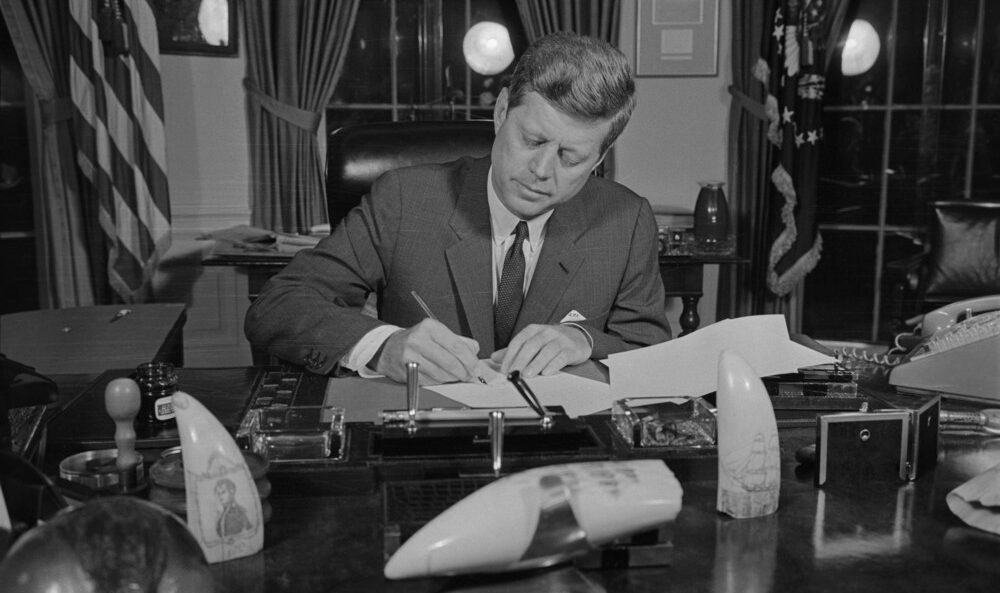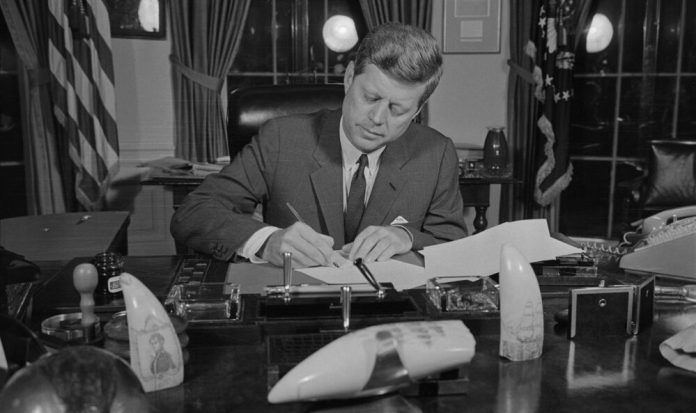
“If you ain’t first, you’re last.”
Talladega Nights: The Legend of Ricky Bobby
On August 23, 1956, Jacqueline Kennedy, in the eighth month of pregnancy, was rushed to the Newport (R.I.) Hospital because she was hemorrhaging. The future First Lady awoke later to learn that she had undergone an emergency cesarean section and that the infant was stillborn. Jackie’s condition was critical, and a priest was summoned.
Efforts to reach her husband, U.S. Senator John F. Kennedy, meanwhile, proved difficult. Having lost his bid for the Democratic Party’s vice-presidential nomination a week or so earlier, the senator had chosen to spend the time relaxing at a villa that his father, Joe Kennedy, had rented on the Riviera. Accompanied by Sen. George Smathers and a number of unattached young women, Kennedy was enjoying what one biographer has called a “bacchanalian yachting trip on the Mediterranean.” Three days after receiving the news, JFK finally agreed to go home to his wife. Smathers, with Joe Kennedy’s help, had to persuade him to cut short his vacation. “I told him I was going to get him back there even if I had to carry him,” Smathers said. What did the trick, biographers report, was telling JFK that the press had already learned of the stillbirth, and should he ever run for president, all this could hurt his prospects.
Books about the Kennedys, even from admirers, are replete with stories like this, and this one does not even involve payoffs, bribes, lies, blackmail, attempted murders of foreign leaders, liaisons with Marilyn Monroe, parties with Frank Sinatra and the Hollywood Rat Pack, drugs, mobsters, spies and spooks.
JFK was hardly the only one who engaged in any of this sordid activity—Bobby and Teddy did, too—and some of us had managed to put the stillbirth story out of our minds until the death of Ethel Kennedy on October 10 elicited the usual rapturous notices, from Democratic politicians and their toadies in the press. The recent prominence of Robert F. Kennedy, Jr., selected by President-elect to head the Department of Health and Human Services, has received somewhat less adoring coverage, obviously, but once again brought the Kennedy family and its so-called legacy to public attention, giving—for some of us—our Gore Vidal moment.
Cosmopolitan: “Tell us about the Kennedys.”
Vidal: “Oh, dear, are people still interested in them?”
That exchange between Cosmo and Vidal, a stepbrother of Jackie’s who knew the family well, took place in 1975, and yes, half a century later, people are interested. This includes the press. The former Ethel Skakel, Bobby’s widow, was said to be “more Kennedy than the Kennedys,” the New York Times tells us, and with “energy and humor, she campaigned tirelessly for her husband and other Kennedys,” displaying “grace and resilience.” Her McLean, Va., estate, called Hickory Hill, with its “dozen or so servants…epitomized the vigor of the Kennedy administration and its theme of a New Frontier.” The marriage of Bobby and Ethel, the Boston Globe reported, united “two great fortunes,” much as that of JFK and Jacqueline Bouvier did three years later.
The competitive and athletic Ethel took great pride in giving birth to eleven children—two more than mother-in-law Rose had birthed, but who was counting? Theirs was a “rambunctious brood,” what with “divorces, drug arrests and sex scandals” and overdoses, as well as rape and murder charges. Through it all, whether at Hickory Hill, Hyannis Port, or Palm Beach, as the Associated Press put it, Ethel “remained dedicated to social causes and the family’s legacy.”
We will be hearing about that legacy, it seems, forever. Every time we thought we had heard the last of it, something else—usually unpleasant—happens. which starts the conversation over, and people play connect-the-dots, including more and more dots none of us had ever heard of.
One of the most comprehensive chronologies appears in Edward Klein’s unintentionally amusing book, The Kennedy Curse: Why Tragedy Has Haunted America’s First Family for 150 Years. In it, we learn, for example, that in 1967, Ethel’s sister-in-law Joan Skakel, choked to death on a piece of meat at a dinner party, and in 1999, Anthony Radziwill, John F. Kennedy, Jr.’s “cousin and best friend,” died of testicular cancer. And way back in 1858, not 10 years after arriving on these shores, Patrick Kennedy died of consumption on November 22, a date “which is seen by some as significant as it is exactly 105 years to the day before John F. Kennedy’s assassination.”
What the fates have in store for these people—it’s downright eerie. It’s tragic, actually. That’s the word that comes to mind, over and over, as court historians, wallowing in the bathos of Camelot, tell the story. There is not a whole lot they can claim was accomplished during JFK’s presidency, and evoking retribution from on high is one way to account for this failure.
Seymour Hersh’s The Dark Side of Camelot, which is hardly the work of a right-winger with an axe to grind, should have done more to silence the idolators than it did. Hersh, who doesn’t even mention the stillbirth story, has Bobby and Teddy both running around West Virginia in 1960, cash in hand, paying off local and state officials to secure the Democratic primary victory for their older brother, as the Kennedys “turned what had historically been random election fraud into a statewide pattern of corruption,” stealing the vote from Hubert Humphrey.
Chris Matthews, in the admiring Bobby Kennedy: A Raging Spirit, quotes a Life magazine cover story in 1962 telling readers of RFK’s “contempt for liars” and how “horrified” the attorney general was “to learn that some helpless fellow human has been pushed around by a price fixer, a crooked politician or a conniving labor leader,” and how intense the AG’s “impulse [was] to smite the wrongdoer.” Bobby—give credit where due—was eager to smite. On the next page, Matthews tells of Bobby’s eagerness to smite steelmakers he believed guilty of price-fixing. Seeking evidence to support RFK’s efforts, FBI agents were banging on newspaper reporters’ doors at 3 a.m. to get hold of their notebooks.
Terrible things always intervene before the true and noble promise of the New Frontier can be fulfilled, and the notion that these striving, grasping, cynical climbers are actually accursed by the gods is something that even Bobby came to believe. And why not? Lots of people who should know better seemed to believe it, too. “When John and Robert Kennedy were assassinated, their death seemed, if nothing else, at least commensurate with the drama and weight of their public life,” Time reported. “When their children die prematurely, it can seem almost as if fate were picking them off for sport.”
Klein, who says he was a close friend of Jackie’s, had a hard time with this idea but, in time, came to accept it. At first, he couldn’t quite buy a “supernatural curse,” he admits. But after JFK’s assassination, “it was no longer possible for even the most dedicated rationalist to believe that all this suffering has been a matter of chance.” Every time a Kennedy “was on the verge of achieving a goal or ambition, he was doomed to pay a tragic price.” After a while, it all became clear:
Take the case of Joseph Kennedy, who spent a lifetime trying to elect one of his sons President; as soon as he succeeded, he was struck down by a stroke. Then there is the example of his son, John F. Kennedy, who struggled for three years to master the role of President; just as he showed signs of becoming a skillful commander-in-chief and chief executive, he was felled by an assassin’s bullet. And his son, JFK Jr., married the woman of his dreams, only to be the one who was responsible for both their deaths.
John-John’s marriage, Klein tells us, was “a doomed fairy tale, a nightmare of escalating domestic violence, sexual infidelity, and drugs.” Two pages later, the former Carolyn Bessette is sprawled on the floor of their West Village apartment, “disheveled and hollow-eyed, snorting cocaine with a gaggle of…clothing designers, stylists, male models, and one or two publicists.” On the next page, this “heavy user of street drugs,” is calling her husband “a fag all the time,” and at a party at Donald Trump’s Mar-a-Lago, the sweaty Cinderella tells a roomful of people she “had to take a Puerto Rican bath on the way down in the airplane.”
The Kennedys, of course, always managed to apply a slick shellac of Ivy League gentility to their relentless ambition, and their knack for self-dramatization cannot be questioned. Bobby seems to have come by his acceptance of the family mythology respectably, as a Harvard man would. In the plays of Aeschylus and Sophocles, another admiring biographer, Evan Thomas, writes, RFK “discovered fate and hubris,” though why Kennedys should need instruction in hubris is, if nothing else, puzzling. Bobby, Thomas tells us, “began to wonder if the Kennedy family had somehow overreached, dared too greatly.”
After JFK’s murder, Jackie gave Bobby a copy of Edith Hamilton’s The Greek Way in which he underlined a passage from Herodotus: “All arrogance will reap a reward rich in tears. The gods call men to a heaving reckoning for overweening pride.” The Kennedys “were the house of Atreus,” Klein writes, “noble and doomed, and RFK began to see himself as Agammemnon,” which is an interesting response to a warning about overweening pride. Bobby would go on to quote from memory Aeschylus in his eulogy for Martin Luther King, Jr., though his memory was imperfect, and he got it wrong. Or not: As Thomas writes, Aeschylus “seemed to be speaking directly to Bobby.”
RFK’s son and namesake, proposed by President-elect Trump to head the Department of Health and Human Services, has not received the adulation that his father and uncles have, and the reasons for his own family’s disapproval require some looking into. He has certainly kept the Kennedy name in the headlines for the past few years, early on as a crusader for environmentalism and as a critic of Big Pharma, which would seem to fit in nicely with the family’s image of itself as celebrated champions of progressive causes. RFK, Jr., has also drawn attention to the family for other reasons, too—crusading for these environmental enthusiasms as an independent and as a Republican who has endorsed Trump, which is seen as a betrayal.
He has also called attention to himself as something of eccentric, if not an outright weirdo. There are the three marriages and the allegations of infidelity, though why this would trouble any of his kinfolk is hard to understand. Then there’s the business about dumping a dead bear in Central Park, and how a worm ate part of his brain. (NPR tells us that according to the World Health Organization, more than a billion people suffer from parasitic worms, “the implications [of which] are often serious and lifelong,” though this should not be reassuring if a person with this creepy medical history is selected to head a federal agency.)
The real rub on RFK Jr. seems to be that he is playing for the wrong team and doing so without being as slick about how he conducts himself as other Kennedys have been. He isn’t smooth, and despite his show-biz connections, no one would ever accuse the poor man of being glamorous. Or successful. Phillip Klein in National Review says Kennedy has been “from the very beginning…a charlatan and a fraudster, out to benefit only his own interests.” That he might be correct on some issues “doesn’t excuse the person he has been for most of his adult life: a man willing to lie to enrich and elevate himself.” Why this might trouble thoughtful people at National Review is understandable, but why any of it would cause problems for the spawn of Joe Kennedy is hard to figure. In this, he is carrying forth the legacy, not betraying it.
Subscribe Today
Get daily emails in your inbox
What no one seems to have noticed are the similarities between Joe Kennedy and Fred Trump and how they raised their sons. Both of these hard-charging and sometimes ruthless men made a lot of money and were not fastidious about how they made it. Both of them raised their sons to win at all costs, and, to do so, required a “killer instinct.”
“Daddy was always very competitive,” Eunice Kennedy Shriver, one of Joe’s nine children, said. “The thing he kept telling us was that coming in second was just no good.” Joe, a product of Harvard’s Hasty Pudding Club and ambassador to the Court of St. James, acquired a polish that Fred Trump lacked, which he passed onto his descendants. But scratch the surface, and they might have been more alike than is commonly thought.
One cause for which neither the sons of Joe Kennedy or that of Fred Trump will be remembered is that of women, at least as progressives define it. The Kennedys will not be honored for the way they have treated those plucky ladies who cared for the family’s whitewashed legacy, which progressives most of all should find galling. It is surely ironic. Jackie, who had no more liking for politics than Melania Trump is said to have, nevertheless rose to the occasion, and for this she received high praise from an unlikely corner. If JFK had not “been survived by a woman of exceptional bearing and grace, his reputation would now be dirt.” William F. Buckley Jr., wrote that in 2006, and nothing has occurred since then to make us doubt it.


